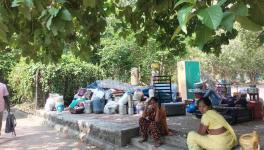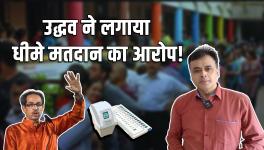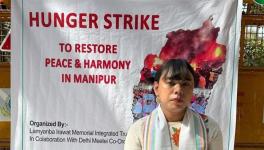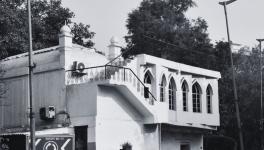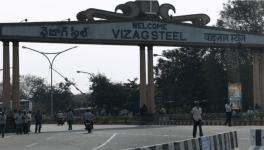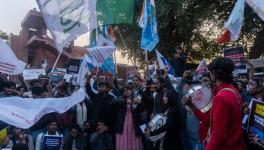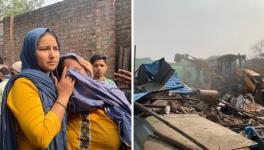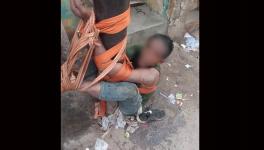Amid G20 Glitter and Glitz, Stories of Sorrow from the City’s Poor Underbelly
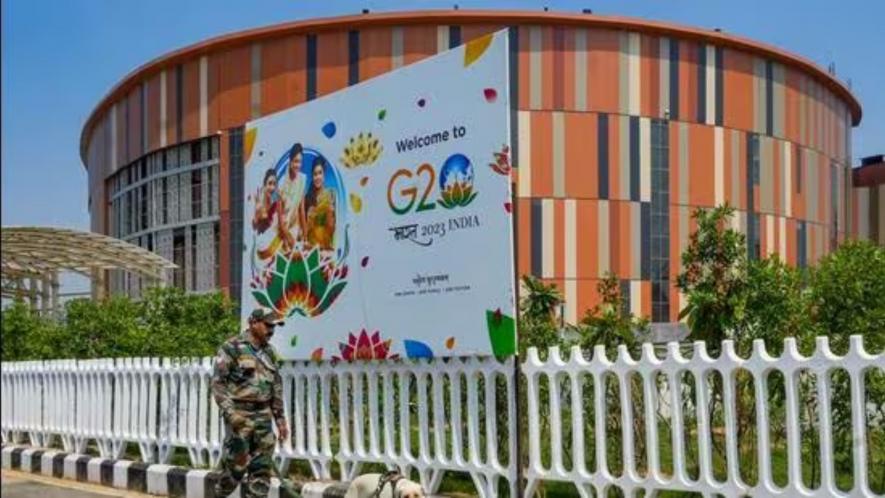
A security personnel with a sniffer dog outside Pragati Maidan ahead of the G20 Summit, in New Delhi, Thursday. Image Courtesy: PTI
The air space in Delhi will be restricted for flying passenger aircraft and will be open only for the dignitaries visiting for the G20 event on September 8-10. Educational institutions, bazars, and major establishments will remain shut for four days. The people of Delhi have described it as similar to Covid lockdown. The taxi drivers and informal workers, who constitute around 90% of Delhi’s workforce will be the hardest hit. Most of them have decided to migrate back to their homes and come back only whence the restrictions are lifted.
But all of this has not started suddenly. In fact, the process of evictions of the people in most of the towns and cities started many months ago as and when the G20 meetings under various heads were being held – youth, urban, commerce, tourism, culture, etc. The cities, almost all of them, acted in a similar way, and that was to either evict the poor from the precincts of the meeting venues or hide their habitat, at some places with tin sheets or even by erecting a wall. The anomaly was in Srinagar, where the shopkeepers were forced to keep their shops open and showcase to the G20 delegates that everything was normal in the valley.
The saga of evictions is very disturbing and heart-rending. The gory stories of those who were evicted due to G20 meetings reveal not just the apathetic attitude of the ruling establishments but also the sheer paranoia over showcasing ‘development’. ‘Beautify the city, criminalise the poor’, continues to be the dictum of the G20 meeting and currently millions are forced to live on the fringes without any roof because of the meeting.
G20 evictions as heard during a public hearing
A public hearing was organised a few weeks ago in Delhi over the G20 evictions. This author was also one of the jurors on the jury. This public hearing exhibited the draconian ways and processes in which these evictions were carried out across the country.
Interestingly, the narrative around the G20 events is set largely around infrastructural improvements and state-of-the-art facilities, the costs of such glitter and glitz are largely borne by the most underprivileged and working population of the city living in informal settlements or slums. Under the narrative of ‘national pride’, the evictions were legitimised.
The evictions were turned into a massive PR exercise to present the might and pomp of India’s economic growth on the world stage. The demolitions in Tughlaqabad and Mehrauli in Delhi were linked to the heritage walks being planned for the G20 delegates. The Tughlaqabad demolitions, one of the biggest, have left more than 2,50,000 men, women and children displaced. The illegality of such ‘encroachments’ is offered as a reason for the forceful removals Not just that, in Delhi, shelters built by state authorities for homeless people on the orders of the Supreme Court were also demolished; here even the fig leaf of “illegality” does not apply.
One of the worst manifestations of the recent spate of evictions was those involving the demolition of the homeless shelters (built by the Delhi government) in the Yamuna Pushta area. This March, for instance, the DUSIB demolished eight of its own shelters located close to the Yamuna floodplains, leaving the homeless with no option but to live on the streets. This was in connection with the beautification drive for the G20. The shelter at Sarai Kale Khan was removed apparently because a park has been constructed nearby – a venue to which G20 dignitaries will be brought. Being at the very margins of the city, the residents of these shelters are the most vulnerable, surviving on daily wages, and struggling with illness, with many among them being reduced to begging. and hardly in a position to even protest against such evictions.
Brutality of the Worst Order
In Nagpur, just prior to the G20 meeting, the beggars were removed from the roads in an overnight scoop and the police stated that all of them, willingly, have gone back to their villages. In Mumbai, the story is a little different. Because of the large size of the slum, evictions could not be carried out, however, the slums were covered with white barricades so that the enroute delegates could not see these slums. In Indore and Vizag, the slums were covered with large walls.
The funny part is that in Vizag, more than 100 tribal families, mostly the Chenchu tribe located in Vizag’s Akkayyapalem neighbourhood, were covered with 400 metres of green sheets, and just a few kilometres away in a luxury hotel, the G20 delegates discussed the theme: ‘Financing Cities of Tomorrow: Inclusive, Resilient, and Sustainable’.
An extremely dreadful tale was reported by a school-going girl from Bella Estate, Yamuna Floodplains in Delhi. Not only the people were evicted and their handpumps destroyed but something unheard of happened. The books and school bags of students were collected by the police and instead of giving them back to the students, these bags and books were buried with the help of an excavator. These people are still living under a flyover bridge in the Yamuna region.
Two important issues are demonstrated by the series of G20 events. Foremost, G20 rendered the marginalised and weaker sections more vulnerable and a State, which prioritises optics over people, does not treat its poor citizens with empathy. Furthermore, there is abject failure of the judicial and administrative mechanisms to ensure adherence to laws and procedures guaranteeing protection to vulnerable populations. Take for example the virtual negation of the Street Vendors Act. Despite such a powerful act, the street vendors were removed at sheer will and fancy of the establishments.
The G20 baton will be passed on to Brazil and the euphoria will soon dissipate, however, the relay to the final round will have marks of unmitigated excruciating pain to the homeless, marginalised and informal sector workers across urban India, who constitute the acronym-CITY MAKERS.
The writer is the former Deputy Mayor of Shimla, Himachal Pradesh. The views are personal.
Get the latest reports & analysis with people's perspective on Protests, movements & deep analytical videos, discussions of the current affairs in your Telegram app. Subscribe to NewsClick's Telegram channel & get Real-Time updates on stories, as they get published on our website.









